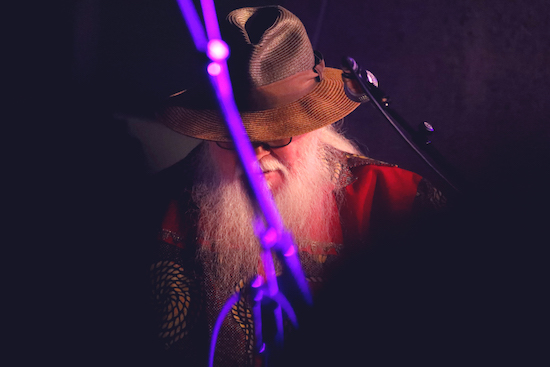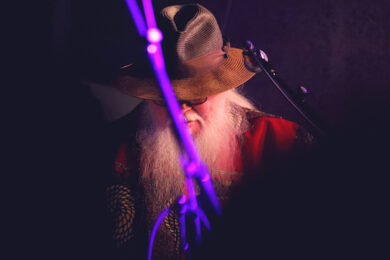Hermeto Pascoal who opened the festival
Imagine you have before you a blank sheet of paper. All existing copyright legislation, the whole history of property laws relating to creative works, has been completely erased. It’s up to you to rewrite it from scratch. Where would you start?
What if, for instance, we were to agree on a broad general principle that, whatever money comes in, the artist would always get paid first, instead of last? What if ‘public domain’ were the default and copyright was something you had to ‘opt in’ to? What if there was a cap on maximum earnings from copyright collection societies? What if we were to separate out control of one’s works from their attribution and remuneration? What if we regarded the whole question less through the lens of property law and more in terms of labour law? And what if we stopped expecting copyright to solve all the problems of the music industry?
These are just some of the questions thrown up when a panel of lawyers, musicians, academics, and other interested parties gathered for two days to discuss this very subject. On the first day of Berlin’s Right The Right Festival, they reported back. With ideas ranging from “total attribution” to a new “creators’ union”, there was a pretty broad spectrum of opinion coming from the stage – with some suggestions clearly more thought-through than others. But one thing that came across loud and clear was a broad consensus that the needs of artists have for too long been sidelined, that it was time now to re-think copyright such that artists’ concerns, for the first time, are put centre stage.
As Harvard law scholar Ruth Okediji put it in her brilliant keynote lecture on the festival’s Friday afternoon, “in important material respects, copyright law has written out creators.” Musicians, she claimed, were far more likely to find themselves the victims of copyright law than its beneficiaries – especially musicians from indigenous communities, or from the global south, or from impoverished communities in the global north.
This is at least partly due to what Okediji called copyright’s “literary bias”. Copyright law was initially created to deal with written works and only somewhat uneasily transposed to the realm of music. Since then, the question of what is copyrightable in a work of music has tended to repeat this literary bias by favouring those elements that can easily be represented in writing – that is, for the most part, the melody and the harmony. The dots on the stave. But this is a prejudice catastrophically unfit for purpose when dealing with pop music. It has, in Okediji’s words, “created a hierarchy within creative circles” and “systematically underserved the vast majority of world cultures.”
The point was underlined by a presentation from English record producer Tot Taylor, one-time songwriter for Mari Wilson, Anita Ward, and Cynthia Scott. “Everything starts with ‘Hello’…” Taylor announced, strolling on to the little stage of the Haus der Kulturen der Welt’s cafe dressed from head to toe in the darker tones universally favoured by music industry professionals of a certain age. He proceeded to play, from the Spotify app on his phone and a Nord Lead keyboard, a small selection of the literally thousands of pop hits that do just that – by Lionel Richie, Adele, Electric Light Orchestra, and so on – all of which seem to follow the same chord sequence, and all of which start their ‘Hello’ on the 5th note of the opening chord.
Taylor can trace out the links between Lana Del Ray and Radiohead and The Hollies and Vera Lynn and Alexander Borodin. He can show you how ‘Life on Mars’ borrowed from ‘My Way’ and ‘Bohemian Rhapsody’ from Rachmaninov. But he’s not making some grumpy old man comment about how all pop music is the same, is unoriginal, uncreative, going down hill, or any of that bollocks. “I can do this with jazz, I can do this with classical,” he insists, but “the magic doesn’t go away.” The point is that there just aren’t that many chords or immediately pleasing melodies that stick over the top of them. And when you reduce pop music to its writable elements, you do it a disservice. In Taylor’s telling, who gets sued and who doesn’t comes across as more or less arbitrary.
John Oswald could be seen leaning against a wall by the side with a wry smile on his face during Taylor’s presentation. The Canadian composer has spent his career cocking a snoop at copyright rules and stretching the definition of ‘fair use’ ever since he coined the term ‘plunderphonics’ to define his practice back in the mid-80s. On the Friday evening, he took us through a few highlights from his back catalogue in the manner of a deadpan suburban dad showing off a particularly ribald set of holiday slides. “All popular music (and all folk music, by definition), essentially, if not legally, exists in a public domain,” he argued in his original 1985 essay. “The hit parade promenades the aural floats of pop on public display, and as curious tourists should we not be able to take our own snapshots through the crowd rather than be restricted to the official souvenir postcards and programmes?”
Whether slamming together the particles of a decades’ worth of CD hits on ‘Plexure’, or simply cutting Albert Ayler solos onto Lisa Simpson, Oswald takes music history as a raw material to be gleefully strip mined and artfully recombined. Whatever changes we might see to copyright in the future, one would certainly hope it continues to allow him to do what he does.
On the basis of several of the live performances at Right the Right, you’d be forgiven for thinking that artists wished universally to tear down the copyright regime completely. Chicks on Speed interrupted their set to skype in Eric Schrijver, author of Copy This Book: An Artist’s Guide to Copyright, who rather unhelpfully compared artists’ control over the use of their work to an autoworker’s lack of control over the use of the tires on their production line (because the alienation of wage labourers under capitalism is… good now, apparently). Mitch & Mitch with Kassin played their set of funky cosmic instrumentals in front of a rolling dollar ticker beneath images of their faces and Sting’s, as if to prove that no matter how hard they work, the Northumberland-born Shaggy collaborator will always earn more just by sitting on his arse. Howie Lee, after blasting out a set of dazzling sino-futurist electronica, boasted, “I did a lot of stuff without permission. And a lot of people are stealing my stuff too. But I don’t get angry. I’m always happy for people to copy my stuff.”
But much as a degree of scepticism towards copyright on the part of artists is understandable, we actually have a pretty good idea of what a musical ecosystem without copyright would look like – it would look like contemporary Nigeria where, in the words of Lagos-based journalist Joey Akan speaking on the Sunday afternoon, artists are “clamouring for new legislation” because the only way they can currently get paid for their work is by taking it overseas.
There is a need for more nuanced approaches – and Right the Right presented no shortage of ideas. While Mat Dryhurst and Holly Herndon worried about the politics of accreditation when accounting for the huge data sets needed for the kind of AI-based music featured on Herndon’s recent, Proto album; Femke Snelting of Brussels-based non-profit Constant presented a whole raft of alternative licensing agreements, from licenses which acknowledge the creative role played by bacteria (for artistic work involving fermentation) to the “non-white heterosexual male license”, which allows anyone to use the work in question however they like – providing they are not a white heterosexual male.
But perhaps the most effective intervention suggested was also the simplest: Ruth Okediji’s proposal that an author’s right should be “inalienable”, that authorship and ownership should be inseparable, a tie impossible to cut (or sell or unknowingly sign away). It’s a small step, but one that would do a great deal to address the deep embedding of inequality and loss of control.



